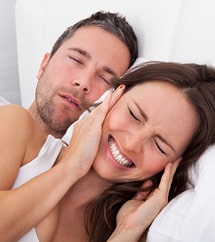
Sleep Apnea in Livonia, MI
If you wake during the night coughing, sputtering, or choking, or feel that you’re gasping for air, you may be suffering from sleep apnea. Sleep apnea is a sleep disorder that involves the oral tissues of your soft palate and throat, and can often be treated by your dentist. The exhaustion due to waking during your sleep cycle is problematic, but a list of other dangerous symptoms makes sleep apnea a more serious issue than you may realize. Contact Dr. Stewart if you think you may be experiencing sleep apnea, and get started on your way to a healthy night’s sleep.
What Is Sleep Apnea?
There are two types of sleep apnea. Obstructive sleep apnea can be treated by Dr. Stewart’s office. Central sleep apnea, however, is a neurological disorder that we do not treat. Read about the differences below:
- Obstructive sleep apnea: This is the most common form of sleep apnea, and occurs when the soft tissues in your throat relax. Your airways become partially closed and your breathing stops, causing you to wake suddenly, gasping for breath. Obstructive sleep apnea often includes snoring.
- Central sleep apnea: Because your brain fails to send the proper signals to your body to continue breathing normally, resulting in sudden stops and starts in breathing, this type of sleep apnea is considered a neurological disorder and, therefore, requires treatment by a neurologist.
What Causes Sleep Apnea?
Several issues can lead to sleep apnea, some of which you can address on your own, while others require treatment. Certain factors, including genetics or certain physical traits, are out of your control. Because you are asleep when it happens, many people are unaware they even have a sleep disorder. According to the National Sleep Foundation, of the approximately 18 million Americans that have sleep apnea, only 10 to 20 percent are aware of it. Of the 24 percent of women and 40 percent of men who snore habitually, it is estimated that half suffer from sleep apnea. Possible causes of sleep apnea include:
- Stress
- A large neck
- Alcohol consumption
- Smoking (tobacco)
- Down syndrome
- Being overweight
Is There a Sleep Apnea Test?
If your symptoms do not clearly point to sleep apnea, Dr. Stewart may suggest being tested. Once the diagnosis is made, he can offer you treatment options. There are two types of tests used to diagnose sleep apnea:
- Home sleep test: You can test yourself for sleep apnea in the comfort of your own home. Dr. Stewart will provide you with a portable device that includes sensors that detect when you start and stop breathing.
- Sleep study: If your home test is normal, but you display symptoms associated with sleep apnea, we may suggest you undergo a sleep study conducted by a sleep center lab. A doctor will monitor you while you sleep in a private room. This testing is more advanced and detailed than a home test. Sleep study tests also measure your brain and muscle activity to detect even mild cases of sleep apnea.






